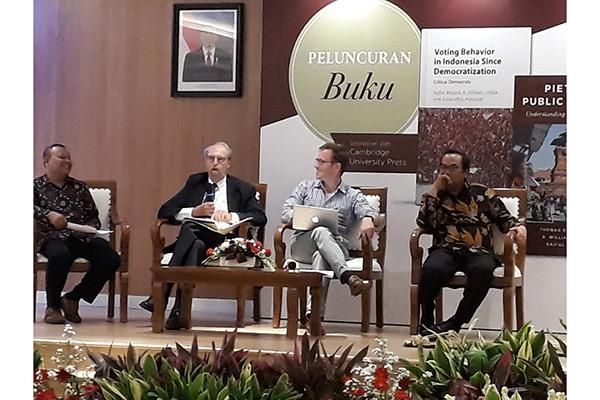Liddle launches two books in Jakarta ceremony

Mershon affiliate Bill Liddle, is a celebrity of sorts in Indonesia, known for his lifelong scholarship about Indonesian politics as well as his mentorship of Indonesian scholars.
In July, Liddle, professor emeritus of political science, was the star of the show during a launch for two of his books held at the National Library in Jakarta. About 300 people attended the invitation-only event, including the governor and vice-governor of Jakarta.
The books Liddle launched were Voting Behavior in Indonesia since Democratization: Critical Democrats, with Saiful Mujani and Kuskridho Ambardi (Cambridge University Press, 2018), and Piety and Public Opinion: Understanding Islam and Political Behavior, with Thomas Pepinsky and Saiful Mujani (Oxford University Press, 2018).
In addition to Liddle and his three co-authors, the launch featured Indonesia's most prominent political talk show host acting as moderator, and three discussants, all prominent public intellectuals and academics. After the discussants spoke, there was about an hour of questions from the floor.
The main topic of discussion was the rise of radical Islamic clerics and whether they pose a threat to the democratic constitution, which is multi-religious rather than strictly secular. Indonesians may adhere to one of six religions: Islam, Protestantism, Catholicism, Hinduism, Buddhism, and Confucianism. Orthodoxy for each is determined by officials of the Ministry of Religion in consultation with the relevant clerical organizations.
Piety and Public Opinion directly addresses the issue of whether pious Muslims prefer to be governed by syariah (Islamic law), while Voting Behavior in Indonesia examines religion as one of several independent variables influencing how Indonesians have voted in six national elections since democracy was restored in 1999.
Liddle and his co-authors find that most Muslims and Muslim voters do not want changes to the constitution or a syariah state, but are instead rational voters influenced by perceptions of governmental performance, especially connected to the economy, much like voters elsewhere.
This summer, Liddle also won the Anugerah Kebudayaan (Culture Award) from the Indonesian Ministry of Education and Culture, given each year to foreigners in the social, political, economic, law, culture, and science fields who have greatly benefited the nation and state of Indonesia.

